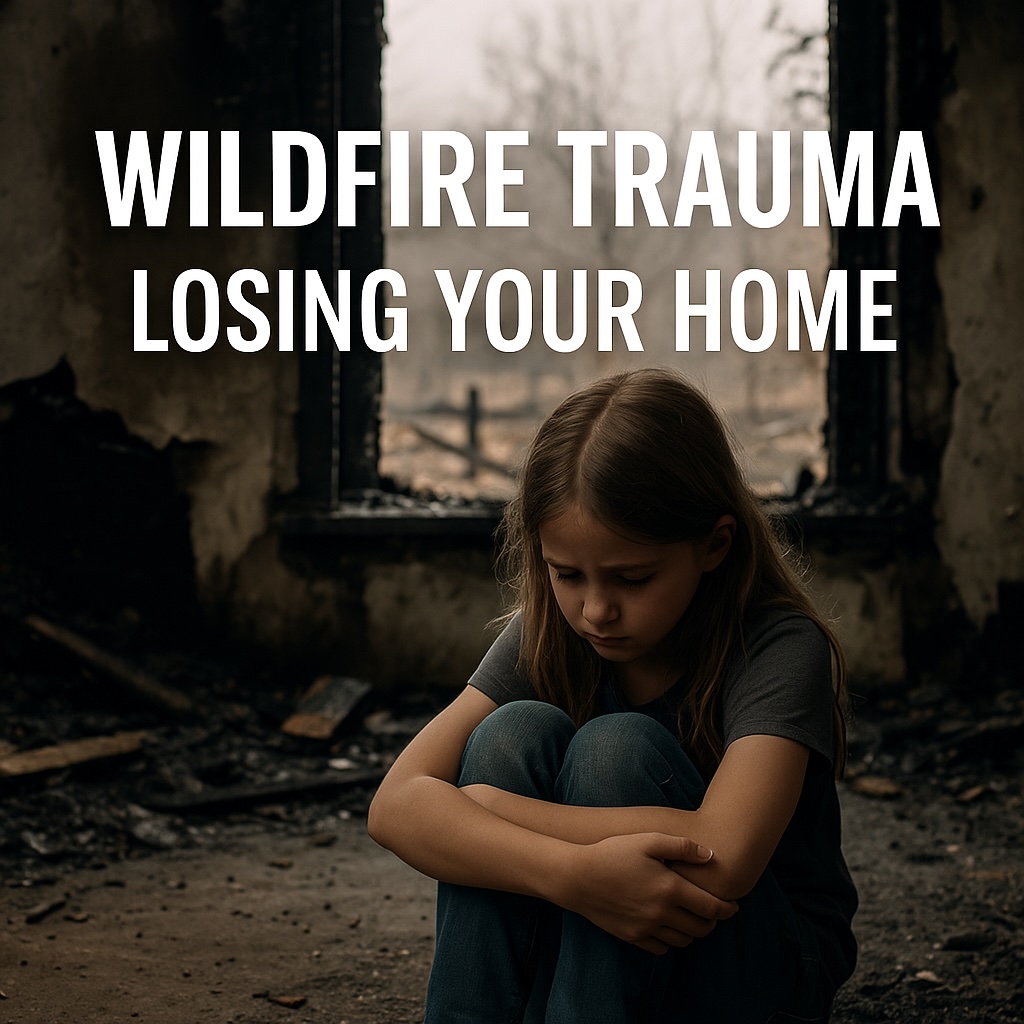A wildfire doesn’t just burn trees and buildings—it shatters lives. It can erase decades of memories, safety, and identity in mere minutes. For survivors, the trauma doesn’t end when the fire is extinguished. That’s often when the true devastation begins.
Adults may face profound grief, helplessness, and disorientation. The place they called home—the one safe space in a chaotic world—is gone. This loss often triggers depression, anxiety, and even post-traumatic stress. The emotional wounds cut deep, leaving invisible scars long after the physical ashes are cleared.
Children, on the other hand, may feel the trauma even more intensely. They often lack the language to express what they’re going through. Many lose their sense of safety and normalcy. Nightmares, fear of separation, and regression in behaviour are common. The emotional impact of such a loss during formative years can shape how a child perceives the world—and their place in it—for the rest of their life.
While therapy, community support, and time help people heal, prevention remains the most powerful tool. Mitigating wildfire damage before it begins is key to reducing the long-term psychological toll.
This is where exci’s AI-assisted bushfire/wildfire detection system offers critical hope. By detecting fires early, within minutes of ignition, exci helps prevent small fires from becoming catastrophic. This technology not only protects homes but shields lives from the emotional trauma that follows their loss.
In the following sections, we will explore what a home truly means, how its loss affects both adults and children, the stages of psychological recovery, and how exci’s AI technology helps prevent these tragedies before they unfold.
The Meaning of Home
 Welcome Home sign. Source: pexels-pixabay
Welcome Home sign. Source: pexels-pixabay
A home is more than a roof, four walls, and a mortgage. It’s a physical anchor for our identity and a container for our memories. It holds the smell of morning coffee, the creak of familiar floorboards, and the feeling of peace when we return from a hard day. Psychologists describe a home as an extension of the self, deeply tied to our sense of safety, belonging, and emotional stability.
When people lose their homes, they don’t just lose a structure. They lose a part of themselves. This is why survivors often describe the experience not just as disorienting, but as a form of grief. They mourn what was, what will never return, and the version of themselves that once existed within that space.
The Grieving Process of Losing a Home to Wildfire
 Grieving woman. Source: pexels-karolina-grabowska
Grieving woman. Source: pexels-karolina-grabowska
Just as with other forms of profound loss, there are emotional stages of grief people often pass through. According to psychologists, the first is shock—a numbing disbelief that this could have happened. This is followed by disorientation, as the routines and symbols of daily life vanish overnight.
Next comes grief—not only for the objects and memories destroyed but also for the loss of security, comfort, and self. People may feel as though a part of their personal history has been erased.
Then there’s resentment and frustration—why did this happen? Could it have been prevented? Survivors often experience guilt, wondering if they could have done something differently to prevent the tragedy. These feelings can weigh especially heavily on parents trying to reassure and protect their children.
Eventually, with support, many reach a phase of adaptation. This doesn’t mean the pain disappears, but people begin to rebuild their sense of home, even in a new place or with different belongings. This stage takes time. And for some, it never fully arrives without deep emotional support and community connection.
The Emotional Toll on Adults After Home Loss
 Destroyed home by fire. Source: pexels-f-hektor
Destroyed home by fire. Source: pexels-f-hektor
Adults experiencing this loss may struggle with a sense of failure or helplessness, especially if they see themselves as protectors. According to Psychology Today, the emotional toll can lead to depression, anxiety, insomnia, and even post-traumatic stress disorder (PTSD). Many find themselves in a survival mode, making urgent decisions while emotionally overwhelmed.
Moreover, the rebuilding process is rarely straightforward. Insurance disputes, temporary housing, and financial strain often prolong the distress. Without a stable base, it’s harder to heal emotionally. The longer the uncertainty persists, the more profound the psychological impact becomes.
Equally important, the loss of community compounds the grief. Familiar neighbours may relocate. Daily routines disappear. The sense of shared belonging fades, and with it, the emotional resilience that connection brings.
Loss of Home from a Child’s Perspective

While the previous section focused on adults, children experience this trauma through a very different lens. They may not understand why their world has been turned upside down, but they feel the shift profoundly.
Children often process loss through behaviour. Increased clinginess, mood swings, and developmental regression are common. A child who once slept soundly may now wake with night terrors. Losing beloved toys, drawings, or even a favourite corner of their room can trigger immense grief.
Furthermore, parental distress can amplify their fear because children look to adults for safety cues. If the adults seem anxious or lost, children often internalise the idea that the world is no longer safe.
Psychologists emphasise that helping children recover requires restoring stability and routine. But when a home is gone, even simple comforts like bedtime stories in a familiar room are lost, making healing longer and more complex.
Rebuilding More Than Just a House

Rebuilding a home after a fire is often faster than rebuilding a sense of self and safety. Emotional recovery involves mourning, processing, and eventually accepting a new reality. But this process can take years, especially for those without adequate support.
Mental health services, trauma-informed care, and social connections are vital in long-term wildfire recovery. Support groups help normalise the grieving process, while community rituals and shared rebuilding efforts foster hope and a sense of belonging.
Equally important is the need for public policies that prioritise disaster mental health. Infrastructure is essential, but so is emotional resilience. Without it, people remain displaced—mentally and emotionally—even if a new house replaces the old one.
Learn more about the broader mental health effects of wildfires.
How exci Helps Prevent the Trauma of Home Loss
exci’s AI-assisted wildfire detection system is crucial in preventing wildfire trauma and loss. Utilising cameras and satellites, exci’s Australian-made system scans for smoke and thermal anomalies. When signs of a fire emerge, exci’s AI identifies it within minutes and immediately alerts the relevant authorities.
This early warning gives emergency responders the critical time to act before a fire escalates. More importantly, it gives families more time to evacuate, secure belongings, and potentially save their homes.
Unlike traditional systems that rely on slower methods or human observation, exci operates 24/7, with unmatched speed and accuracy. The technology covers remote, rural, and high-risk zones, ensuring fires are caught in their earliest, most manageable stages.
Moreover, the system provides real-time camera access, enabling users to assess the situation. This reduces panic, improves decision-making, and supports faster coordination during emergencies.
By stopping fires before they destroy homes, exci helps preserve more than just property. It safeguards the memories, identity, and emotional security that make a house a home. It is a technology built not just on innovation but also on empathy.
Protecting the Heart, Not Just the House
A house can be rebuilt. But a home is made of memories, meaning, and a sense of belonging. When that is lost to wildfire, the emotional toll can be devastating, especially for families with young children. The grief is real. The trauma is lasting.
However, trauma does not have to be inevitable.
With early detection and rapid response, we can protect lives and preserve what matters most. exci’s AI wildfire detection technology is a vital step in this direction. It gives us time, clarity, and a chance to act before loss becomes irreversible.
In a world where wildfires are growing in frequency and intensity, it’s time we protect homes not just from flames, but from the silent, lasting damage that follows. Prevention is not just about saving buildings; it’s about saving lives. It’s about keeping the emotional foundation of every life touched by fire.
Let’s move from reacting to preventing. Let’s support Australian technologies that protect not only our homes but the hearts that live within them. Together, we can create stronger, more resilient communities—where families are not just supported through recovery, but shielded from the trauma of loss in the first place.
by Gabrielle Tylor
exci – The Smoke Alarm for the Bush
Early AI-Powered Bushfire & Wildfire Detection Technology
3 May 2025

 Grieving woman. Source: pexels-karolina-grabowska
Grieving woman. Source: pexels-karolina-grabowska